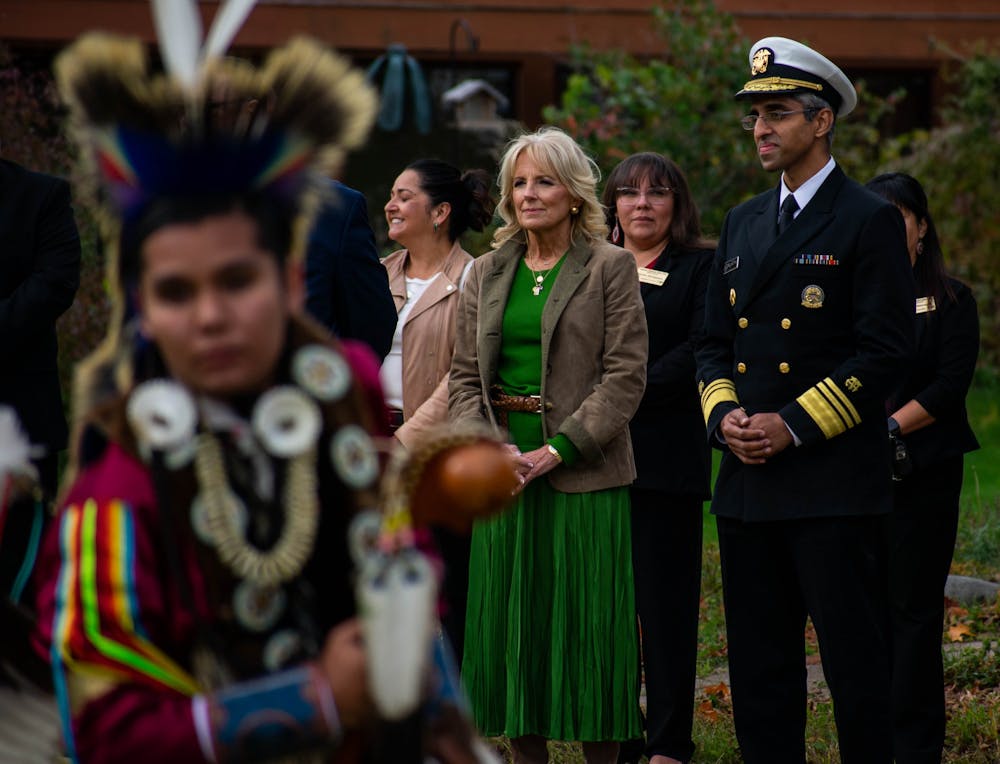First Lady, Saginaw Chippewa Indian Tribe discuss mental health, tribal history

First Lady Dr. Jill Biden and Surgeon General Dr. Vivek H. Murthy watch as members of the Saginaw Chippewa Tribe perform an intertribal dance on Sunday, Oct. 24 at the Ziibiwing Center in Mt. Pleasant, MI.
The Saginaw Chippewa Indian Tribe waited with anticipation for First Lady Jill Biden’s motorcade to arrive and take her first steps onto their reservation. Their home.
It was the first time the White House visited the tribe in its history, said Frank Cloutier, the Saginaw Chippewa Indian Tribe public relations director. Cloutier said for years, the tribe has dealt with trauma from the past and has waited for a platform to have its voice heard.
Biden, accompanied by Surgeon General Vivek Murthy met with Saginaw Chippewa Indian Tribe representatives for a listening session about youth mental health. The conversation focused on education and healing for the tribe after a longstanding battle for their culture and wellbeing.
“Second graders had experienced devastating loss,” Saginaw Chippewa Academy Director of Education Melissa Isaac said. “We had one whose father committed suicide and then I had another whose mother died of cancer. I had no idea how to help them.”
Isaac’s family was also present for the roundtable. Nathan Isaac is a kindergarten teacher for the tribe. He said members of his clan are all family spiritually and have a responsibility to support each other.
“(My family) had a hard time, but as families, we do our best to keep them together,” Nathan said.
Chief Tim Davis said the fallout from Native American boarding schools and other forms of discrimination in tribal history have harmed their families and culture. The COVID-19 pandemic also posed a challenge for classrooms.
The tribe partnered with Project AWARE to help classrooms recover from the past and the pandemic. On top of funding from grants, the project has provided counselors for students, support groups for grief, loss and anxiety, and therapy dogs. Classrooms also have “calming corners” for anyone who needs a judgment-free zone.
“It can’t just be put on the individuals to practice self-care,” Kehli Henry, a Project AWARE coordinator said.
Adding to Henry's point, Biden said things like calming corners should be taught to all teachers as a way to help students.
Murthy facilitated the discussion and asked each member of the roundtable to share. He said his grandfather was an impoverished man from India who spent much of his time supporting his community, despite not having the resources to care for his own family.
“People would say to (my grandfather), ‘you’re so irresponsible for own kids. You don’t have enough to eat and yet you’re traveling around raising money for other people’s kids,’” Murthy said. “He would stop and he would say, ‘you know those kids are our kids too.’ I’m reminded of that spirit because you all embody that so beautifully.”
Biden was greeted by the tribe with traditional drumming, singing and dancing. At the end of the event, she was gifted with a blanket, a pendant and a basket, all from the Saginaw Chippewa Indian Tribe.
"Our mental health problem is so great, and the needs are so great, especially after this pandemic," Biden said. "What gives me hope is programs like Project Aware that go into the schools and into the communities."
Later tonight, Biden will attend and be the guest speaker at Yeshiva Beth Yehudah's annual dinner in Detroit.
She'll fly to Joint Base Charleston in Charleston, South Carolina after the event.







